Jul 30, 2018 | vendors
I was toodling around my home town of Evanston recently and suddenly realized (and I’m giving away my age here) that I’ve been associated with this pleasant burg for 50 years as of this summer. I grew up here, and now I live–and often work–in the one and only Evanston, Illinois.
And I love working on weddings in Evanston. I’ve had the privilege to work on many, and I hope there will be many more. (I know I have one coming up in a few weeks, and I’m very excited!)
Because I’ve been around for a while, I know my way around this town pretty well, and I know a lot of the wedding (and party) resources available. So, I’m going to showcase some of the many people and organizations and places that can help to make any wedding special right here in my home town.
Today, I’ll talk about venues. In the weeks to come, I’ll focus on other vendors you may or may not have heard of. And, I assure you, there are many more places and people in this town that I don’t have room to showcase!
Let’s start with hotels. The grande dame of Evanston hotels is surely the Hilton Orrington. This hotel was built in the 1920s and has been updated many times. But it has never lost its vintage charm. A much more modern hotel is the Hilton Garden Inn, around the corner from the Orrington. I have not worked at the Garden Inn, but I’ve been in it, and it seems to have all the amenities you would expect from a hotel.
There are also a couple of venues that fall into the category of “vintage home or club.” The first is the venerable Woman’s Club of Evanston. Their vintage clubhouse is located very conveniently downtown and has both an impressive second-floor ballroom and some smaller rooms (equally charming) on the first floor. A little south of downtown Evanston is the Charles Gates Dawes House/Evanston History Center. While this is mainly a history museum, it is suitable for small gatherings, especially if you love well-maintained historic houses.
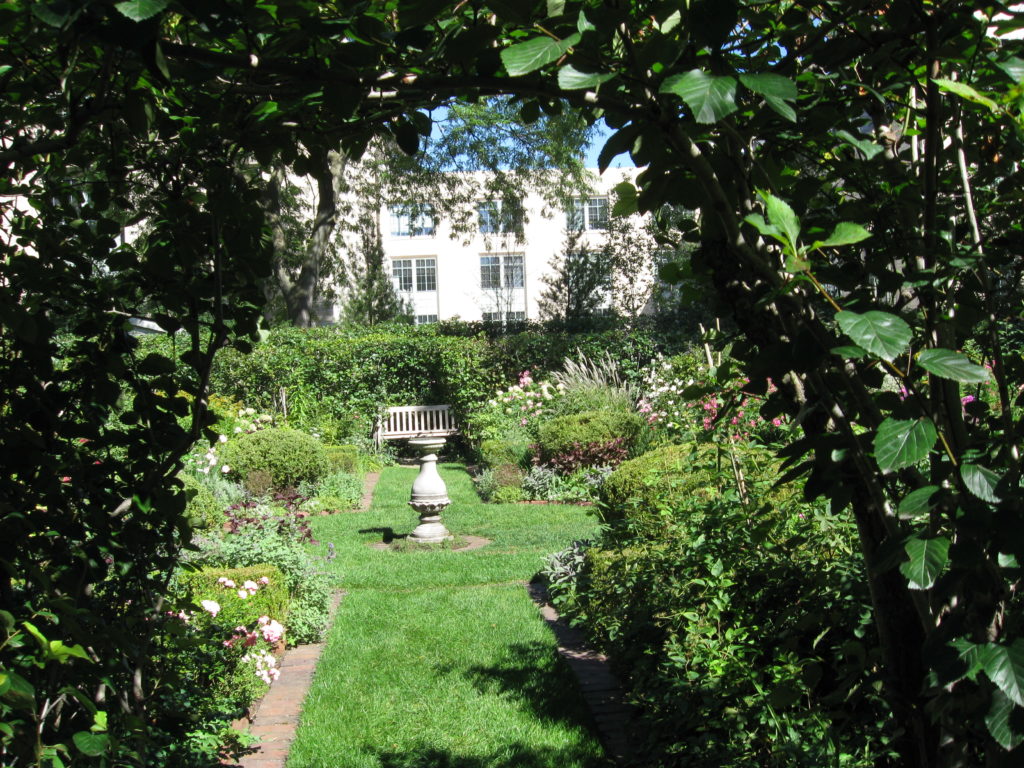
A view of the lovely Shakespeare Garden.
I know of two lovely gardens where wedding ceremonies are permitted. Both have the drawback of not permitting the use of either chairs or tents, but are certainly worth looking at. My personal favorite is the Shakespeare Garden on the Northwestern Campus. Another option is the Merrick Rose Garden, owned by the city.
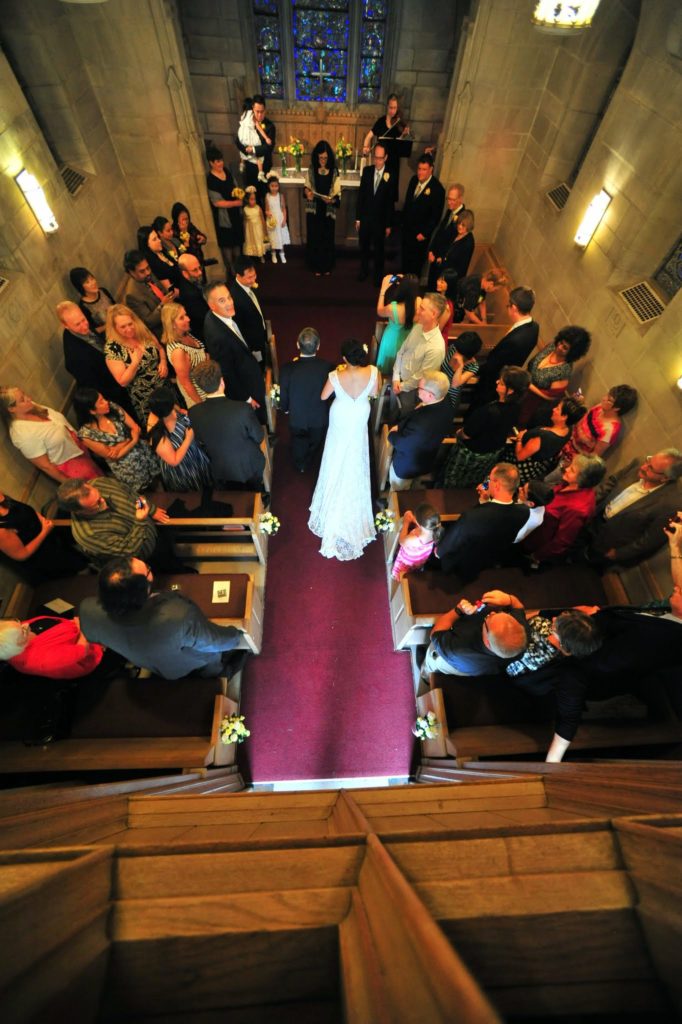
The interior of charming Howe’s Chapel. (Photo by Peter Coombs Photography.)
Some less well known spaces include the Halim Time and Glass Museum, one of the newest venues in the city; the Evanston Art Center in north Evanston; and the Crystal Ballroom. Howe’s Chapel (very near the Shakespeare Garden and often used as a back-up location in case of inclement weather) is another little-known space.
Finally, if you’re looking for less expensive or less formal locations, the City of Evanston and its park district own and operate a number of buildings that are available for event rentals.
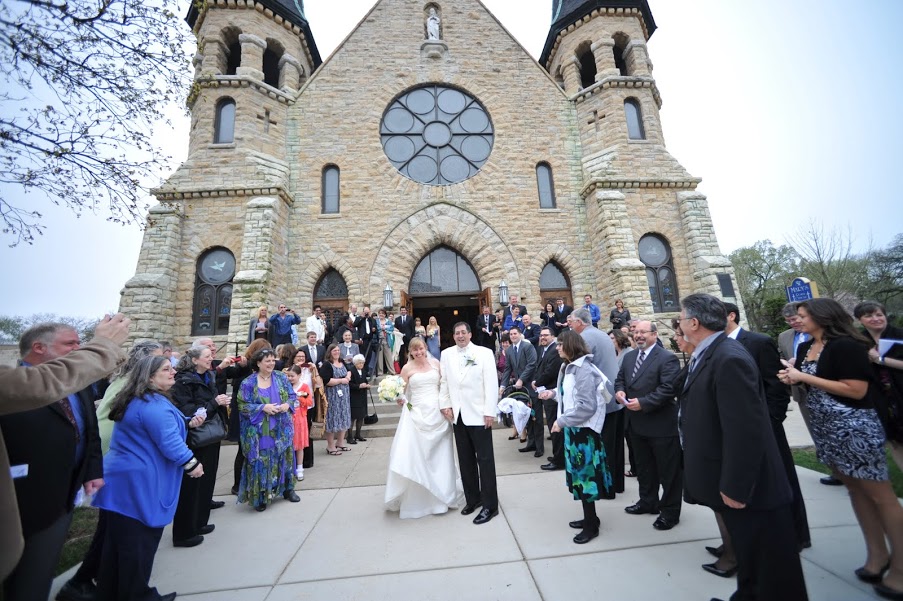
Historic St. Mary’s church is only one of many in downtown Evanston. (Photo by Peter Coombs Photography.)
And really, I’m just scratching the surface here. Northwestern University has some venues, although mainly they only rent to people who have an affiliation with the university. Garrett Theological Seminary has a second chapel, in addition to Howe’s Chapel, mentioned above. And there are many, many smaller spaces and public parks that are suitable for various functions. We have historic buildings and modern construction. That’s not even mentioning the plethora of churches and synagogues in town. In short, there is something for everyone. And that’s just one of the reasons why I love Evanston!
Jul 23, 2018 | wedding planning
This is part three of this series on budget party planning. Here’s an in-depth look at budgeting for the food at your event:

Photo courtesy of Artisan Events, Inc.
One very important thing you can do to control your catering costs is to have a fairly firm budget number in mind before you talk to a caterer. Every client I have ever told this to says, “But I don’t know what it costs.” That’s the secret: You tell the caterer how much you want to spend and it is up to them to come up with a menu within your budget. Don’t expect caviar on a frugal budget, of course, and do discuss your target budget number with any potential caterer. A good one will be able to tell you if what you are asking for is even reasonable. If you don’t go in with a budget number, they will start at the high end. You can make adjustments as you go along, of course, but it is easiest to start with your budget amount.
One way to think about your catering budget is to break it down into two (or three parts). First, consider how much per person you want to spend on food alone. Compare your per person price to what you might pay in a restaurant. At a highest-end restaurant, you could easily spend $100 per person for dinner, or more. But at a high quality neighborhood restaurant, you can get away with $40 per person. Of course, the prices at a restaurant also include a different kind of overhead from the caterer, but this gives you a way to start thinking about the costs. Float a per-person number with any caterer you talk to and see if they think they can come up with a menu in that price range. If three or four caterers find your numbers too low, you may have to increase them. But you should be able to find someone to work within any reasonable budget.
The second part of your catering budget is service–what you are paying for the chef, servers, and other kitchen workers. Most caterers charge service per worker per hour, and they will break this number down on your estimate. A less scrupulous practice is to charge service at a flat cost per guest. This method does not reflect the caterer’s actual expenses and may end up costing you more. A third method is to charge service as a percentage of food costs. If a caterer insists on charging a flat rate per guest and won’t give you actual service costs, consider looking elsewhere, unless you find that they actually have the best price.
If you want to cut down on service costs, you might consider buffet service, which requires fewer people to give smooth service. On the other hand, caterers generally must provide more food for a buffet than for plated service, which might offset the savings provided by fewer servers. Ask your caterer if buffet is an option for you and see if a buffet will offer you savings. It depends on a lot of factors: price of labor, price of food, number of guests, etc. A conscientious caterer can give you a comparison of the prices.
Depending on your venue and your caterer, the third part of any estimate you receive may be rental equipment charges. These charges should show up separately from food and service on your catering estimate. Some caterers will break out the rental list with prices for each item so you can see what they expect you to pay. Most caterers will not do this, however, and if you want to compare the details, you may need either a rental catalogue and an Excel spreadsheet or the help of a planner. I have actually broken down rental costs for a client and compared them to the prices I would expect to pay to help her to see the true costs of the proposal. Rentals can add up to a substantial sum of money, so don’t overlook the necessity if you are at a venue that doesn’t supply everything you need. There are ways to control cost here, too, although not as many. You can rent flat linens, instead of glossy, and you can rent the least expensive china, silverware, and glassware. You can also shop around among rental houses for good prices. Be aware, however, that there are rental companies that offer good prices but substandard service. Get recommendations or references for rentals so you are not stuck with poor service or dingy equipment.
Always start with your food budget number before you begin your shopping. You may have to revise this number as you get a feel for realistic costs, but don’t believe anyone who tells you that you can’t feed a crowd for less than $100 per person in food costs. If you are creative and are working with a flexible caterer, you can have a celebration to remember without breaking the bank.
Jul 16, 2018 | Budget Planning
This is second in a series on budget event planning. Today, let’s talk about the location for your event.

At the front door of The Grove in Glenview. Photo by MWD Photography.
When you are planning an event, one of your largest expenses will be the location. But there are lots of ways to have a beautiful event without spending half your budget on the venue. There are plenty of high-profile, downtown locations where you could drop ten thousand dollars just to walk in the door–and all you get is the room. You can take a look at those to get ideas, but then keep looking.
My favorite place to start looking for inexpensive party locations is the local park district. And I don’t mean you should be stuck at the field house in the local park. Park districts often take over historical houses or other structures and rent them out to make a little extra money. The Chicago Park District has the Berger Park Mansion or Promontory Point. Glenview has The Grove. In Wilmette, there is a very cute party room at Gillson Park. Sometimes you can get an even better deal if you live in the town where the park is located, or if you know someone who lives there who would be willing to co-sign the contract to get the in-town rate.
In the suburbs of Chicago, there are also women’s clubs and community houses, especially in the older suburbs. Some of these are not cheap, but sometimes you can get a good deal. These venues often provide tables, chairs, white linens, china, and silver. The style of the china might not be what you would choose, but having those items included in the rental can save you a bundle on renting them.
Another option is to go outside the city. If you are willing to move your event from Chicago to southern Wisconsin, there are halls available at a reasonable rate. There are also some venues in the distant suburbs that offer good deals.
If you want to stay in the city but have limited funds, try restaurants with party rooms. These rooms are often available at no charge. The restaurants make their money on the food and drink. Some restaurants can handle decorations, audio/visual equipment, and other special requests. Not all restaurants are suitable for a large wedding, but there are some that can even handle a complex event such as that.
Also, smaller museums, art galleries, and other arts organizations sometimes rent their spaces at reasonable rates. They do not always advertise widely, so you will have to do some research to find them–or ask a professional planner for advice.
And don’t overlook institutions you have a relationship with. Your church or synagogue, a cultural institution where you have a membership, or the arts organization you support may be able to offer you space at a reasonable price. Also, to save money, consider planning your event for an off day or time. Morning events are often less pricey than evening ones. Sundays are often less expensive than Saturdays. And if you can have your party on a weekday, you can often get a real bargain.
If you have no budget for a venue, you can try asking friends or family with a nice home to help you by letting you have your party at their home. This option depends entirely on your connections–and on their willingness to do you a huge favor. But even if you don’t have friends with large houses, you can still have a party or wedding for a reasonable price if you look a little beyond the easy choices. There are very nice locations within your reach.
Jul 9, 2018 | Budget Planning
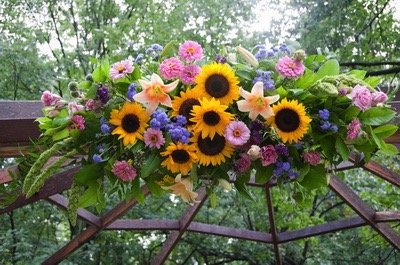
Even on a budget, you can have a lovely celebration. Photo by Magical Moments Photography.
This is the first in a series that I plan to run for the next few weeks. It’s a re-run of a series I did a number of years ago about how to plan your next event without breaking the bank. Today is an overview on the topic. I’ll follow it with posts about some specific categories relating to planning.
Even on a budget you can have the event you want. It requires some extra work and maybe a few compromises, but you can still get married or have a bar mitzvah or throw the party for your parents’ anniversary and have a real celebration. Working on a budget is something I do a lot, so I’d like to share some of my insights with you.
The first thing is to have an actual budget. This is sometimes an item that people put off, but I urge you to come up with a realistic budget as early in the planning process as you can. It will help to guide your choices as you plan your event. The main reason for procrastination, I think, is the simple fact that many people do not know how to go about preparing a budget. Here is my method:
Start with the total amount of money you are able to spend on the event. Be realistic about your ability to spend, including any contributions others have committed to making. It is not worthwhile to spend more on any event than you have. Unless your circumstances are unusual, it is not generally a good idea to go into debt for a wedding or other celebration. I also do not recommend spending everything you have for one day’s celebration.
Next, list all the things you intend to spend money on. Include everything you think you might need, and add a “just in case” category. For a wedding, your list might include, for example, ceremony venue, reception venue, catering, photographer, cake, flowers, invitations, day-of coordinator, officiant, and decorations. Once you have a full list of budget items, make a list or spreadsheet with them.
Now comes the hard part: Fill in a number next to each category and make sure the total does not exceed your total budget number. (Computer spreadsheet programs such as Excel make this job much easier.) But how do you know what number to put there? You will have to do some research. Talk to vendors and other professionals (such as an event planner). Poke around online to get a range of prices. Make a few phone calls. Decide what things you can do yourself to save money and what things will require professional services. For example, you might make place cards and table numbers yourself at minimal cost, if you have the time. (You can take a look at my DIY wedding series for ideas on what to do yourself–and what not to do.)
Finally, if your cost estimate exceeds your resources, you will have to find places to cut. You may have to reconsider how you define what you need and remove some categories, or you might have to make do with smaller quantities or lesser quality on some things. You can also consider cutting the guest list. It is all about deciding what your priorities are and then putting the money there.
These decisions are not easy, but keep in mind that the most important thing about any celebration is not how opulent it looks but what happens between the people who are there. If it’s a wedding, getting married is the most important thing that will happen. If it is an anniversary or birthday party, the important thing is to honor the ones who have reached a milestone. If you can manage a lavish entertainment in addition, consider it a bonus.
Jul 2, 2018 | wedding planning

Non-traditional venues definitely come with some additional planning needs. (Photo by Allison Williams Photography.)
As you’re planning your wedding (or any celebration), do you ever have that nagging feeling that you are forgetting something? You may be–and the things you aren’t thinking of are all completely glamor-less. Here are a few things you might want to add to your to-do list:
- Garbage. Your party is probably going to generate some garbage. You can reduce the amount by focusing on recycling and composting, but there is going to be some. If you’ve hired a full-service caterer, you probably don’t have to give it any more thought. If you are having a party at home, in a non-traditional venue, and/or without a full-service caterer, it is always going to be a consideration. Do you have enough garbage/recycling receptacles? Do you have enough garbage bags? Where does the trash go after the party? Is it going to cost anything to dispose of it?
- Bathrooms. Again, if you’re in one of the many usual places for weddings and parties, this is probably not something you need to think about. But for large parties at home or somewhere unusual (forest preserve??), it deserves some thought. What kinds of facilities are available? Are they well kept? Are there enough of them? Do you need to rent portable restrooms? What are the rules about that? Do you want to spend the extra money to get the really nice ones?
- Clean-up. No matter where your party is (except, maybe, at home), there will be stuff that needs to be removed after the fun is over. This is generally the last thing people think of, but you can get a jump on it now. Who will take the decor, the gifts, the leftovers? How will they be transported? And what happens to them afterwards? Do you want your guests to take home anything? As I said, it’s not glamorous, but it’s important.
As you’re doing your planning, keep all these things in mind so you don’t have any unpleasant surprises. After all that, is what good planning is all about!
Jun 25, 2018 | Eco-Friendly Events
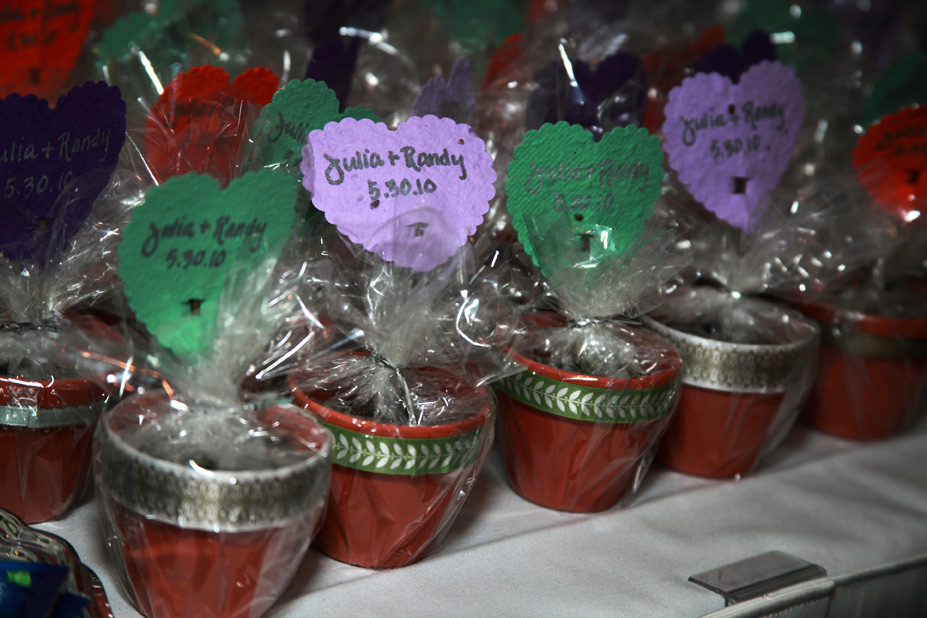
It’s the little things that count: This couple was able to give sustainable favors to their guests. Photo courtesy of christytylerphotography.com
I run into a misconception sometimes: Green weddings are an East (or West) Coast fad for fashionable rich people who can afford to be sustainable. Nothing could be further from the truth! Far from being a fad or a lifestyle choice for the well-to-do, eco-friendly weddings and celebrations are an easy choice for everyone.
I think when people think of being environmentally conscious, they automatically assume the need for organic food and flowers–and we know that organic is going to be more expensive than conventional. On the other hand, I would say that while organics are one possibility at your celebration, it is probably more important to make sure that there is a minimum of food waste, and that might actually save you money.
The thing about sustainability is that it often means doing less, rather than spending more. Maybe you will decide to skip buying favors for your guests, for example. That means less shipping and less overall waste, and it is less expensive. Perhaps you will opt for a venue that needs no decoration so you don’t have to put money into decor that just gets thrown out. Or, if you have decor left over, you can get it into the hands of someone who will re-use it. That might make you money, or, at least, will cost you nothing but time. And it is very eco-friendly!
The important thing to remember is that perfectly green solutions don’t exist. No one is insisting that if you have an environmentally friendly wedding that it has to be perfectly so. Frankly, I don’t think that any kind of standard of perfection ought to be applied to weddings, including how sustainable they are. If you want an eco-friendly wedding, do what you can with the time and money you have available. Every little bit helps.
And if you are expecting to hire a planner or day-of coordinator, you might as well hire one who can help you green your wedding. That doesn’t cost any more than any other kind of planner!
Jun 18, 2018 | wedding planning
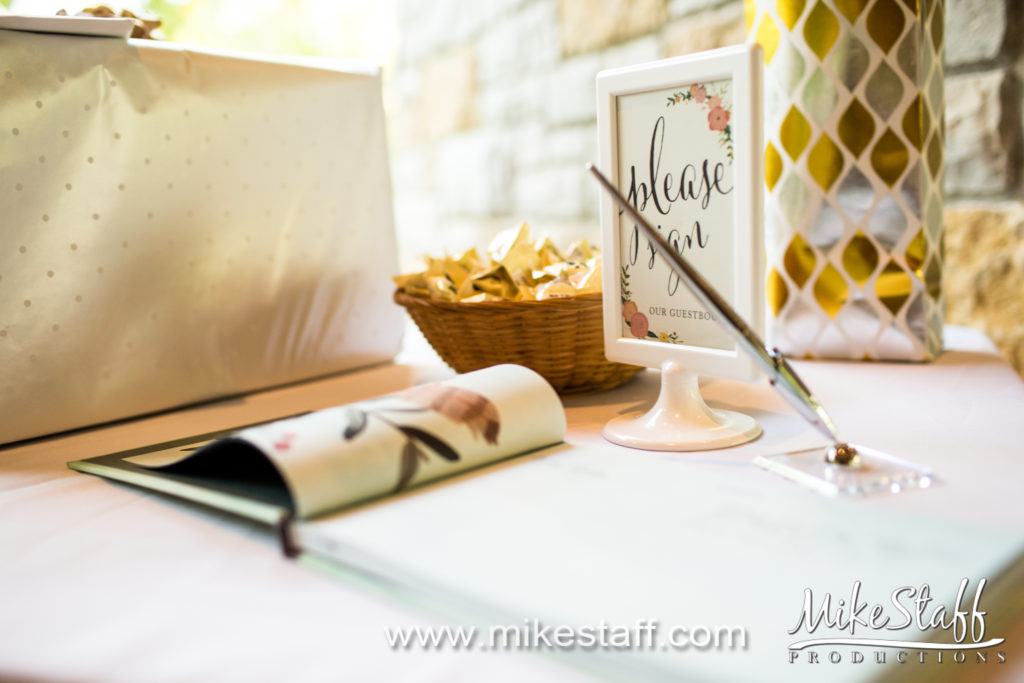
The most traditional of traditional guest books.
Are you planning to have a guest book at your upcoming wedding? There is no right answer to this question! It is one to consider, though, if you are coming up on the wedding soon.
I’ve seen some things online saying that the guest book used to be a legal document for all the witnesses to the wedding. But I have not seen any references for that statement, so I don’t know whether or not it is true. I would imagine that one traditional use of the wedding guest book would be if your entire church congregation is invited to the wedding, then a guest book would tell you who actually showed up. (It used to be more commonly the case that the reception following a church wedding would have a separate invitation, and not everyone was invited to both.)
The way most people do weddings these days, that would not be necessary, as the couple generally has a very good idea of who is coming and who actually shows up. So, then, what is the point of the guest book?
The way it has evolved, the guest book is now often a wonderful way for guests to write a note to the couple. The traditional, lined guest book (like the one at the head of this article) is not conducive to creativity, but a blank book (or other place for people to express themselves) often brings out heart-felt sentiments from the guests. There are plenty of other options, as well.
A creative couple I worked with a few years ago had this for their guest book:
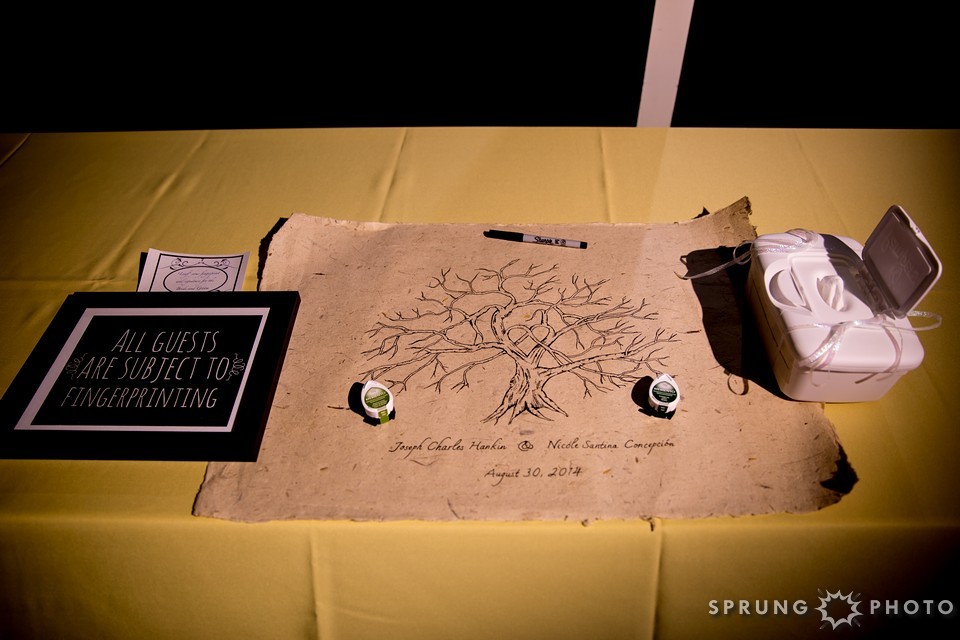 In case you can’t see what it is, it’s a drawing of a tree, with ink pads on it. The sign reads, “All guests are subject to fingerprinting.” The guests’ finger- and thumb-prints were added as the leaves on the drawing of the tree. There is also a pen there for guests to write their well-wishes.
In case you can’t see what it is, it’s a drawing of a tree, with ink pads on it. The sign reads, “All guests are subject to fingerprinting.” The guests’ finger- and thumb-prints were added as the leaves on the drawing of the tree. There is also a pen there for guests to write their well-wishes.
One of my very favorite recent guest books was at the wedding of a couple of scientists. Here was their guest book:

Photo by Allison Williams Photography.
Yes, that’s right: They used a lab book for their wedding guest book! And here is an example of how their guests used it:

Photo by Allison Williams Photography.
Of course, if you’re a traditionalist, there is nothing wrong with having a good, old-fashioned guest book.
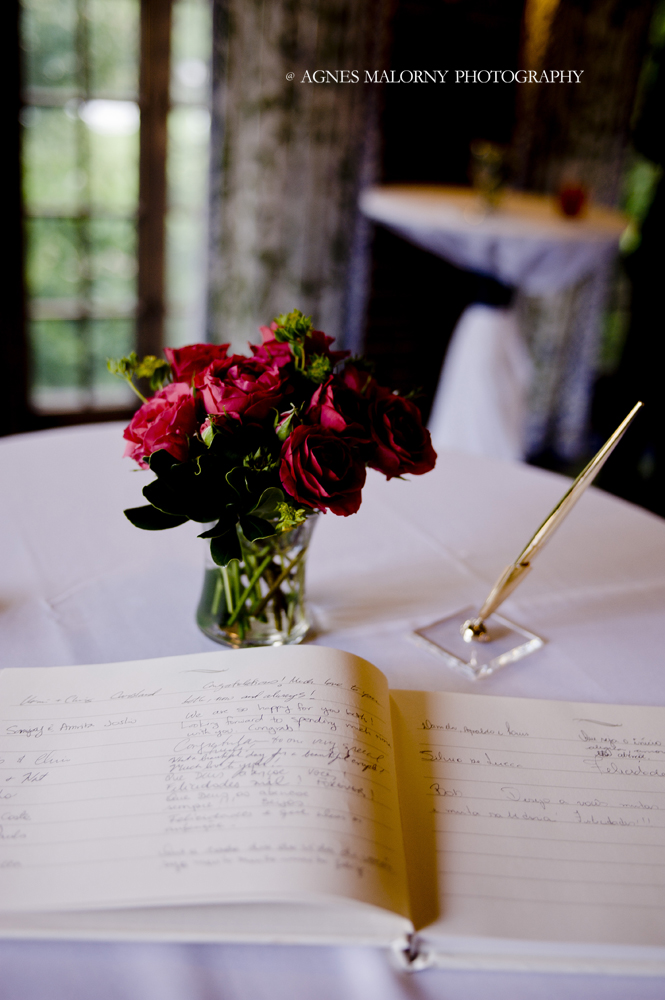
Jun 11, 2018 | Eco-Friendly Events
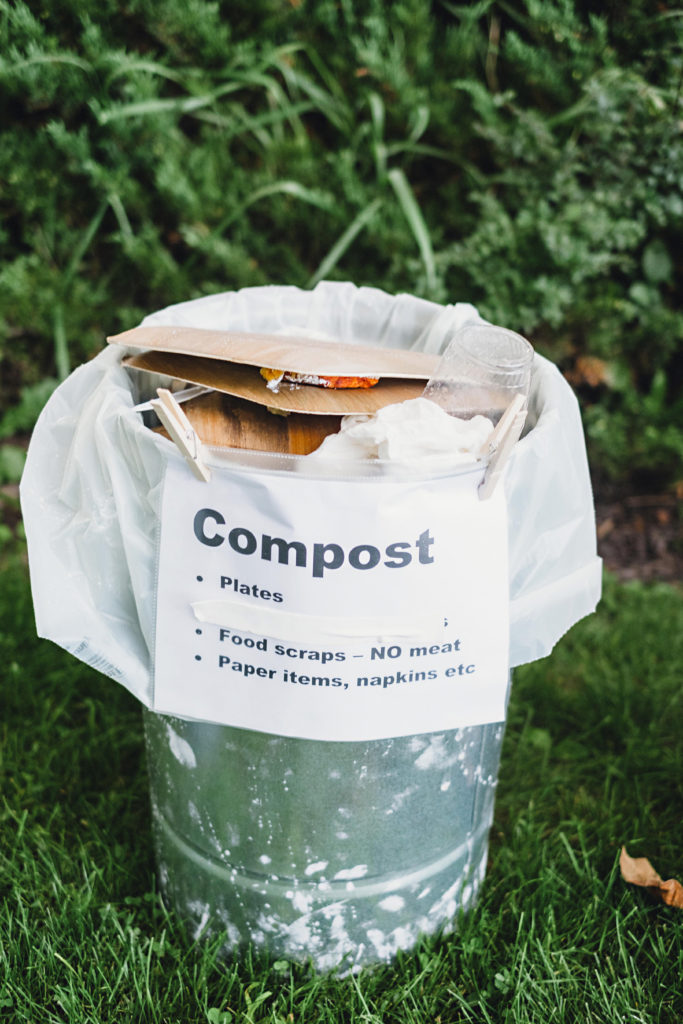
It is all about the compost bucket! Photo by Ryan Timm Photography.
A number of years ago, I wrote a post about compostable disposable dishes. At the time, it was the most accurate, up-to-date information I could find on the subject. But the world has evolved since then, and there is more to know now. So, here are some updates with what is new on the topic:
First, just what is a compostable disposable? Well, plastic (like, for plates, cups, flatware, etc.) can be made from petroleum. That kind is definitely not compostable and you have to throw it out. It is anything but eco-friendly.
But plastic can also be made from corn or sugar cane or various other plant-based sources. Dishes and so on made from that kind of plastic are marketed as being compostable. Compostable dishes can also be made from paper or from wood, such as bamboo. In theory, all of these dishes will break down into rich soil, given the right combination of heat, moisture, other nutrients, and microbial activity. Those dishes are more sustainable, as they don’t use petroleum as a base and they don’t have to end up in a landfill. In a perfect world, they end up on someone’s garden bed making the roses bloom.
So far, so good. But is it really that easy? Well, the first thing to know is that most of the compostable products that are available will not break down in your home compost pile. I have had good experiences with the kind of paper cups and bags that have a thin PLA (plant-based plastic) paper lining. It can still take a year or more for the plastic to degrade, but it does happen eventually. That is not the case with any of the heavier plastics, which require a very hot commercial composting facility.
The other thing to consider is the sourcing of the raw materials. It’s great that such a common (and local to the Midwest) crop such as corn can be used to make party dishes. I always wonder, though, if that is the best use of farmland. The jury is still out on this, but if using corn for plastic ends up driving up food prices, then perhaps it is an unsustainable practice in other ways than environmental. (In 2006, Smithsonian Magazine had a very good article that covered that issue, as well as many others implicated in the subject. For more updated information, try a web search on “biodegradable plastic problem” and you’ll turn up many more articles on the subject.)
What does all this mean for your eco-friendly celebration? One thing hasn’t changed: Probably the least wasteful, lowest impact kind of dishes are reusable ceramic dishes. If you don’t own them, you can rent them. (Or ask your planner for a list of facilities that include dishes in their rental cost!)
If you find that disposables are the best options, shop carefully. I find that restaurant supply stores have the best selection and prices. I like the Eco Products Store and Greenstaurant for most items. Read the descriptions thoroughly, though, and make sure the items are labeled as being compostable, as not everything on each site is. Also, don’t overlook the fact that standard-issue uncoated paper plates and paper napkins are all compostable.
Once used, you’ll want to make sure that all these compostable dishes (as well as food scraps) actually get composted and not thrown out. The easiest way to do that is to hire a composting service. My personal favorite is Collective Resource. They have drop-off service, as most composting companies do, but they will also send a staff member to your event to monitor the compost container and make sure everything is sorted properly. I recommend this highly if you want to be sure that only compostables get into the compost bucket, and that garbage or recycling goes elsewhere.
If you want to search out other composting services, a good (although incomplete) resource is Find A Composter, a national database of composting services.
Composting for your event has gotten a lot easier and more reliable in the last decade. We are definitely making progress in this area. I hope in another decade, we will see more big changes that improve the ways we can throw sustainable parties.
Jun 4, 2018 | wedding planning
I think my services must appeal to introverts as I seem to have a lot of clients who identify themselves that way. It makes sense: I am one, too. And I got married once, so I had an introvert wedding, and I understand some of the hurdles on the way to your introvert wedding.
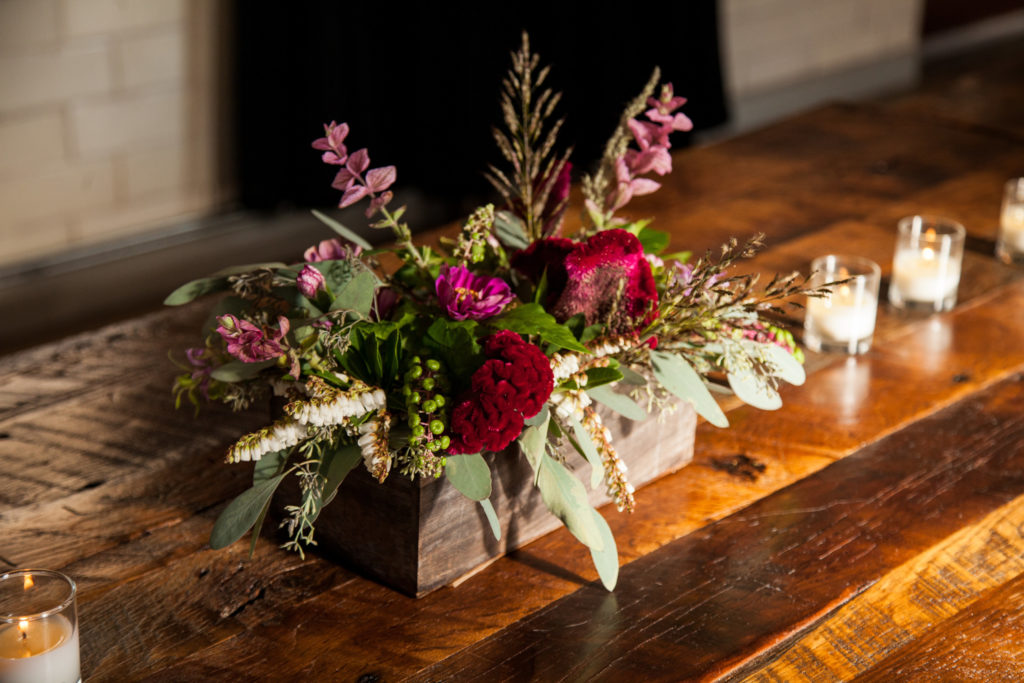
Introvert weddings can look just like extravert ones! (Photo courtesy of Cage+Aquarium. Flowers by May Floral.)
For those of you who are not introverts, perhaps a few definitions are in order. An introvert is not (necessarily) a shy person or an anti-social person. According to the Urban Dictionary, an introvert is “One who focuses on the inner world of thoughts and ideas.” A second definition is, “One who gains energy from alone time, one who thinks before they speak.” (Same source. Not my run-on sentence.)
In case it’s not obvious from the definition, there can be some definite difficulties for introverts getting married. A lot of us don’t care for being the center of attention. Crowds of people, even people we love, can be exhausting. Even things like being photographed are not always pleasant.
So, how do you navigate the difficulties inherent in such a public display as a wedding if you’re an introvert? I would say that the number one thing is to hire people to work on your wedding who understand your point of view and what you want–and who are willing to do what it takes to make your wedding live up to your vision for it. That doesn’t mean hiring all introverts, but it might mean taking the time to thoroughly interview all your wedding vendors to make sure they are sympathetic to your way of thinking, and trusting your gut when it comes to deciding on them. I’m also obligated at this point to mention that hiring a planner who understands your needs will get you access to other vendors with a similar point of view.
Two other things to think about are the size and the style of your wedding. If you can have a smaller wedding without offending friends and family (or if you don’t care!), it will likely be less stressful. And often a more casual wedding will be easier than a more formal one.
In the end, as with all weddings, it is up to you to decide how you want to get married and celebrate. If that means eloping and telling the family later, then that’s what you can do. If a more structured event is still something you want, just remember that you can still make the choices to make it work for you. There is no one right way to get married. There is only the way that is right for you.
May 28, 2018 | wedding planning
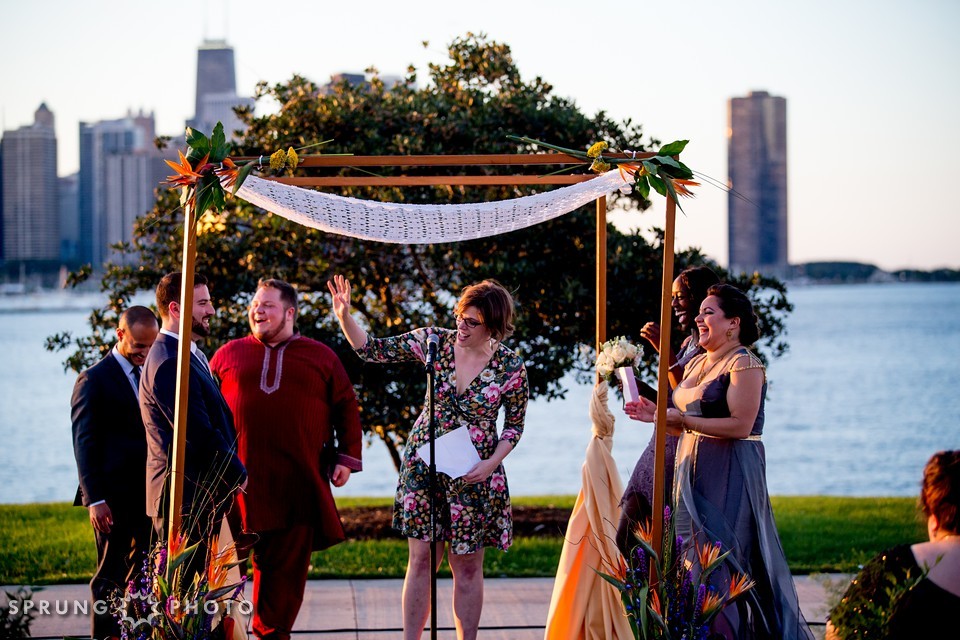
Sometimes, the unscripted moments in a wedding are the most memorable. (Photo courtesy of Sprung Photo.)
I have a confession to make: I didn’t actually watch the whole Royal Wedding last week. I’ve seen bits and pieces of it, and I will say that it looks quite impressive. And from talking with other planners, one of the things that seems to have been outstanding was how smoothly everything flowed.
Now, as you probably know if you know anything at all about me, I have a long history in the world of performance as a stage manager. So, I started thinking about all the things they probably had to do to make the whole event go off so evenly. I am guessing that they had hours of rehearsal with every single participant and huge teams of event/stage managers who wrangled people into place and made sure that everyone was right on their mark. (They probably even had rehearsals for the TV cameras, because that would be necessary, also.)
I hear people saying that this wedding has set a new standard for weddings and it is going to influence all of the style trends. I’ve even heard a planner say she is going to study it to improve her skills in stage management to make her weddings go off like that one did. I’m all in favor of self-improvement, but that makes me wonder: Is the performance element of a wedding really the important thing?
Don’t get me wrong: There is always an element of performance in any ritual created by humans. It seems to be part and parcel of how we do things. (Don’t forget that live theatre started out in ancient Greece as a religious ritual!) Weddings are inherently performative to a certain degree, to the everlasting discomfort of engaged introverts everywhere.
But is the performance element the most important thing? I would argue that it is not. In fact, my contention is that it is the least important thing about a wedding. Making a good spectacle should be near the bottom of the list of concerns. Up at the top of the list, I would put the content or the heart and the meaning of the day. Weddings are about a lot of different things (family, community, love, economics, religion, and, yes, spectacle), but I think that they ought to focus on the people who are getting married and on the project of marriage that they are embarking upon together.
And this is why I tell my clients not to stress about whether or not their wedding day goes like a made-for-TV movie. Yes, the goal is for everything to go off without a hitch, and I always have one eye on creating appropriately dramatic moments, but if there are delays or less-than-perfect performances or even outright mistakes at your wedding, as long as you end up married to the right person at the end of the day, that is all that really matters.

















Recent Comments